Essay: Evidence-Based, Outcome-Focused Practice in Counselling
VerifiedAdded on 2022/12/28
|11
|2959
|90
Essay
AI Summary
This essay critically analyzes the trend towards evidence-based, outcome-focused practice (EBP) in counselling. It begins by exploring the factors that have driven the shift towards EBP, including the importance of therapeutic relationships, fidelity to treatment models, and the need for flexibility and contextual awareness. The essay then examines the ways in which counsellors can contribute to the development of EBP, emphasizing their skills in assessment, cognitive complexity, and ability to foster client engagement. The concepts of client-directed and outcome-focused approaches are defined, highlighting the importance of client preferences and measurable goals. Finally, the essay discusses the potential perils of client-directed, outcome-focused practice, including legal, professional, and personal risks, such as miscommunication, boundary issues, and the potential for harm if interventions are poorly executed. The essay uses a minimum of 10 references in APA style to support its arguments.

Running Head: EBP
0
EBP
Essay
student
5/2/2019
0
EBP
Essay
student
5/2/2019
Paraphrase This Document
Need a fresh take? Get an instant paraphrase of this document with our AI Paraphraser
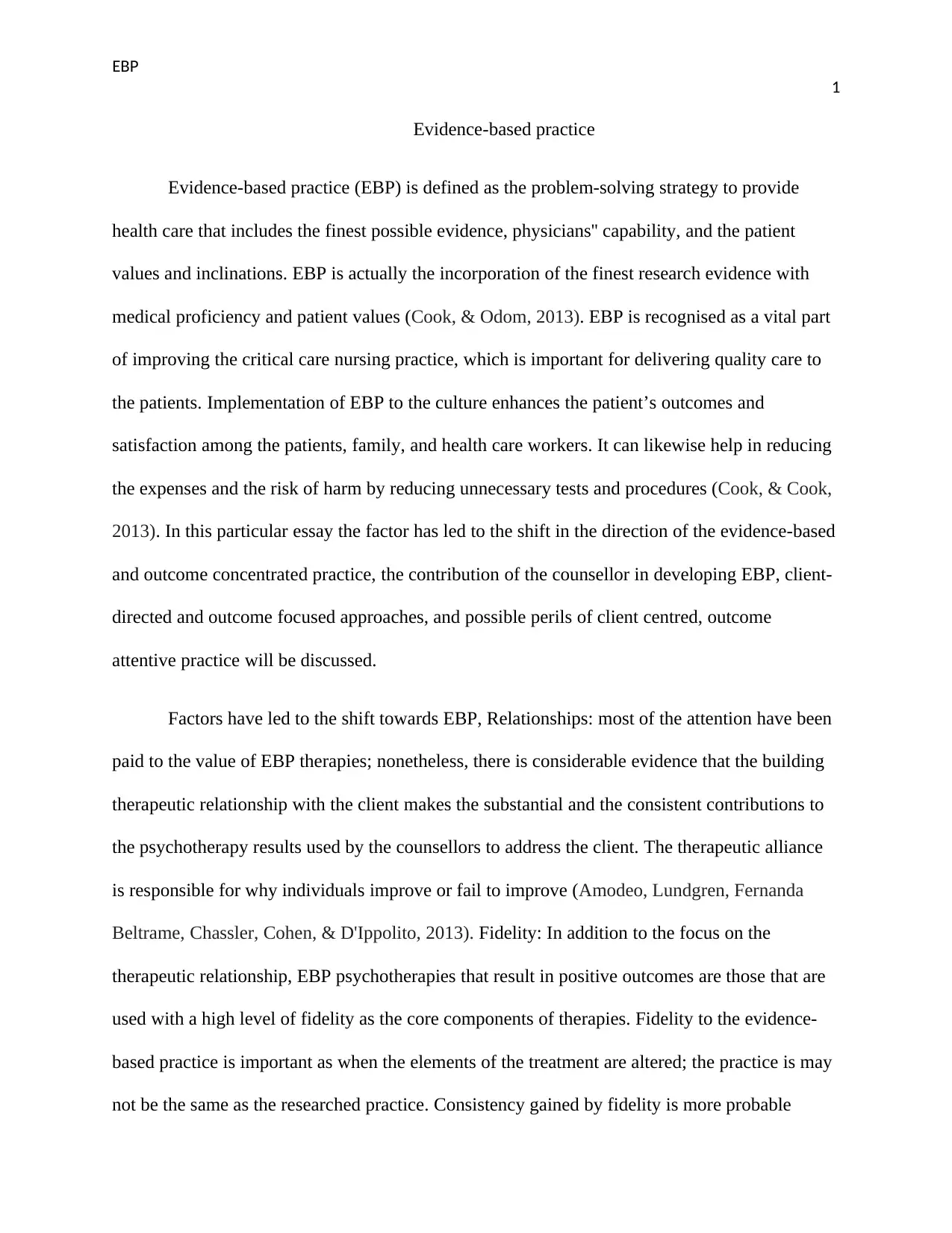
EBP
1
Evidence-based practice
Evidence-based practice (EBP) is defined as the problem-solving strategy to provide
health care that includes the finest possible evidence, physicians'' capability, and the patient
values and inclinations. EBP is actually the incorporation of the finest research evidence with
medical proficiency and patient values (Cook, & Odom, 2013). EBP is recognised as a vital part
of improving the critical care nursing practice, which is important for delivering quality care to
the patients. Implementation of EBP to the culture enhances the patient’s outcomes and
satisfaction among the patients, family, and health care workers. It can likewise help in reducing
the expenses and the risk of harm by reducing unnecessary tests and procedures (Cook, & Cook,
2013). In this particular essay the factor has led to the shift in the direction of the evidence-based
and outcome concentrated practice, the contribution of the counsellor in developing EBP, client-
directed and outcome focused approaches, and possible perils of client centred, outcome
attentive practice will be discussed.
Factors have led to the shift towards EBP, Relationships: most of the attention have been
paid to the value of EBP therapies; nonetheless, there is considerable evidence that the building
therapeutic relationship with the client makes the substantial and the consistent contributions to
the psychotherapy results used by the counsellors to address the client. The therapeutic alliance
is responsible for why individuals improve or fail to improve (Amodeo, Lundgren, Fernanda
Beltrame, Chassler, Cohen, & D'Ippolito, 2013). Fidelity: In addition to the focus on the
therapeutic relationship, EBP psychotherapies that result in positive outcomes are those that are
used with a high level of fidelity as the core components of therapies. Fidelity to the evidence-
based practice is important as when the elements of the treatment are altered; the practice is may
not be the same as the researched practice. Consistency gained by fidelity is more probable
1
Evidence-based practice
Evidence-based practice (EBP) is defined as the problem-solving strategy to provide
health care that includes the finest possible evidence, physicians'' capability, and the patient
values and inclinations. EBP is actually the incorporation of the finest research evidence with
medical proficiency and patient values (Cook, & Odom, 2013). EBP is recognised as a vital part
of improving the critical care nursing practice, which is important for delivering quality care to
the patients. Implementation of EBP to the culture enhances the patient’s outcomes and
satisfaction among the patients, family, and health care workers. It can likewise help in reducing
the expenses and the risk of harm by reducing unnecessary tests and procedures (Cook, & Cook,
2013). In this particular essay the factor has led to the shift in the direction of the evidence-based
and outcome concentrated practice, the contribution of the counsellor in developing EBP, client-
directed and outcome focused approaches, and possible perils of client centred, outcome
attentive practice will be discussed.
Factors have led to the shift towards EBP, Relationships: most of the attention have been
paid to the value of EBP therapies; nonetheless, there is considerable evidence that the building
therapeutic relationship with the client makes the substantial and the consistent contributions to
the psychotherapy results used by the counsellors to address the client. The therapeutic alliance
is responsible for why individuals improve or fail to improve (Amodeo, Lundgren, Fernanda
Beltrame, Chassler, Cohen, & D'Ippolito, 2013). Fidelity: In addition to the focus on the
therapeutic relationship, EBP psychotherapies that result in positive outcomes are those that are
used with a high level of fidelity as the core components of therapies. Fidelity to the evidence-
based practice is important as when the elements of the treatment are altered; the practice is may
not be the same as the researched practice. Consistency gained by fidelity is more probable
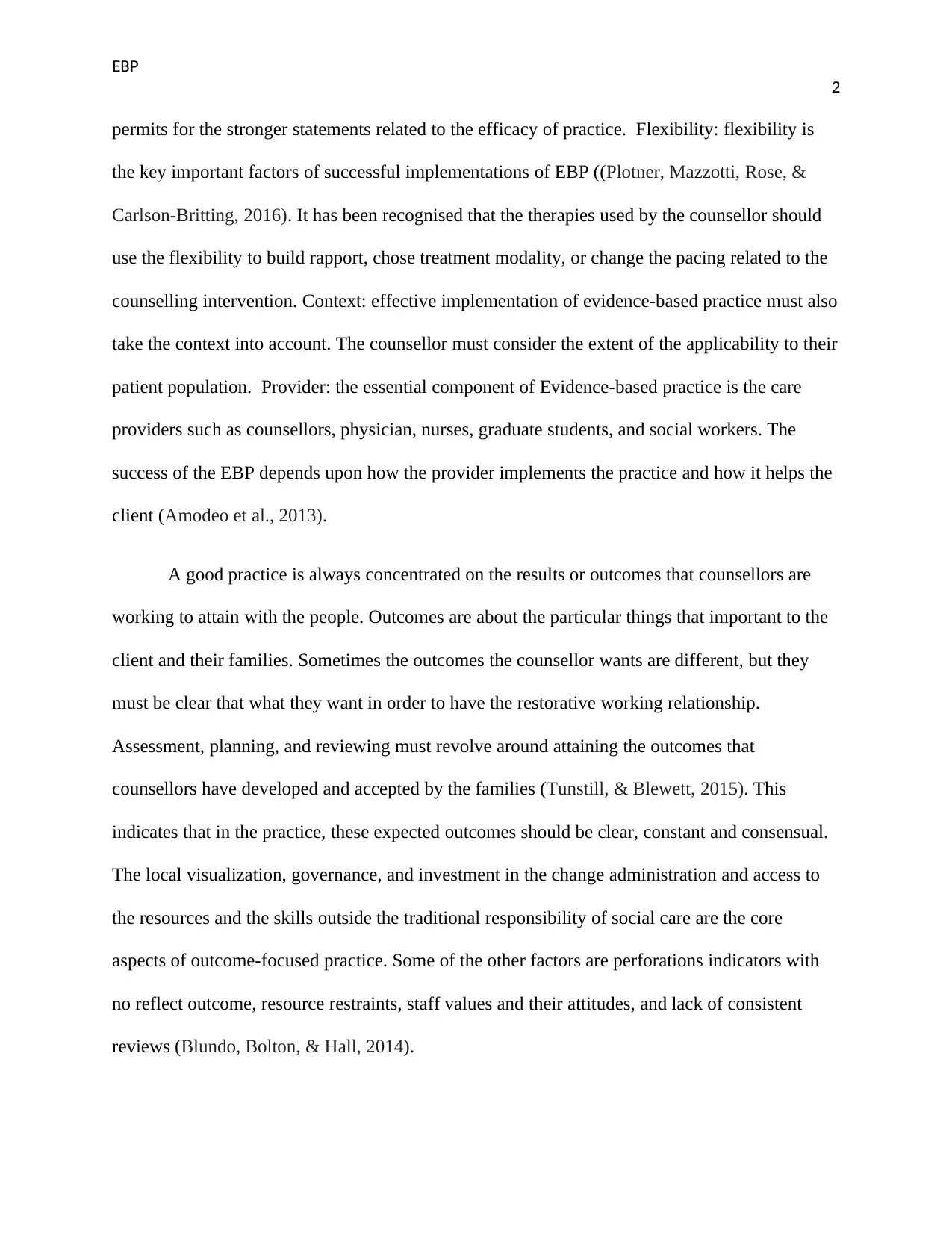
EBP
2
permits for the stronger statements related to the efficacy of practice. Flexibility: flexibility is
the key important factors of successful implementations of EBP ((Plotner, Mazzotti, Rose, &
Carlson-Britting, 2016). It has been recognised that the therapies used by the counsellor should
use the flexibility to build rapport, chose treatment modality, or change the pacing related to the
counselling intervention. Context: effective implementation of evidence-based practice must also
take the context into account. The counsellor must consider the extent of the applicability to their
patient population. Provider: the essential component of Evidence-based practice is the care
providers such as counsellors, physician, nurses, graduate students, and social workers. The
success of the EBP depends upon how the provider implements the practice and how it helps the
client (Amodeo et al., 2013).
A good practice is always concentrated on the results or outcomes that counsellors are
working to attain with the people. Outcomes are about the particular things that important to the
client and their families. Sometimes the outcomes the counsellor wants are different, but they
must be clear that what they want in order to have the restorative working relationship.
Assessment, planning, and reviewing must revolve around attaining the outcomes that
counsellors have developed and accepted by the families (Tunstill, & Blewett, 2015). This
indicates that in the practice, these expected outcomes should be clear, constant and consensual.
The local visualization, governance, and investment in the change administration and access to
the resources and the skills outside the traditional responsibility of social care are the core
aspects of outcome-focused practice. Some of the other factors are perforations indicators with
no reflect outcome, resource restraints, staff values and their attitudes, and lack of consistent
reviews (Blundo, Bolton, & Hall, 2014).
2
permits for the stronger statements related to the efficacy of practice. Flexibility: flexibility is
the key important factors of successful implementations of EBP ((Plotner, Mazzotti, Rose, &
Carlson-Britting, 2016). It has been recognised that the therapies used by the counsellor should
use the flexibility to build rapport, chose treatment modality, or change the pacing related to the
counselling intervention. Context: effective implementation of evidence-based practice must also
take the context into account. The counsellor must consider the extent of the applicability to their
patient population. Provider: the essential component of Evidence-based practice is the care
providers such as counsellors, physician, nurses, graduate students, and social workers. The
success of the EBP depends upon how the provider implements the practice and how it helps the
client (Amodeo et al., 2013).
A good practice is always concentrated on the results or outcomes that counsellors are
working to attain with the people. Outcomes are about the particular things that important to the
client and their families. Sometimes the outcomes the counsellor wants are different, but they
must be clear that what they want in order to have the restorative working relationship.
Assessment, planning, and reviewing must revolve around attaining the outcomes that
counsellors have developed and accepted by the families (Tunstill, & Blewett, 2015). This
indicates that in the practice, these expected outcomes should be clear, constant and consensual.
The local visualization, governance, and investment in the change administration and access to
the resources and the skills outside the traditional responsibility of social care are the core
aspects of outcome-focused practice. Some of the other factors are perforations indicators with
no reflect outcome, resource restraints, staff values and their attitudes, and lack of consistent
reviews (Blundo, Bolton, & Hall, 2014).
⊘ This is a preview!⊘
Do you want full access?
Subscribe today to unlock all pages.

Trusted by 1+ million students worldwide
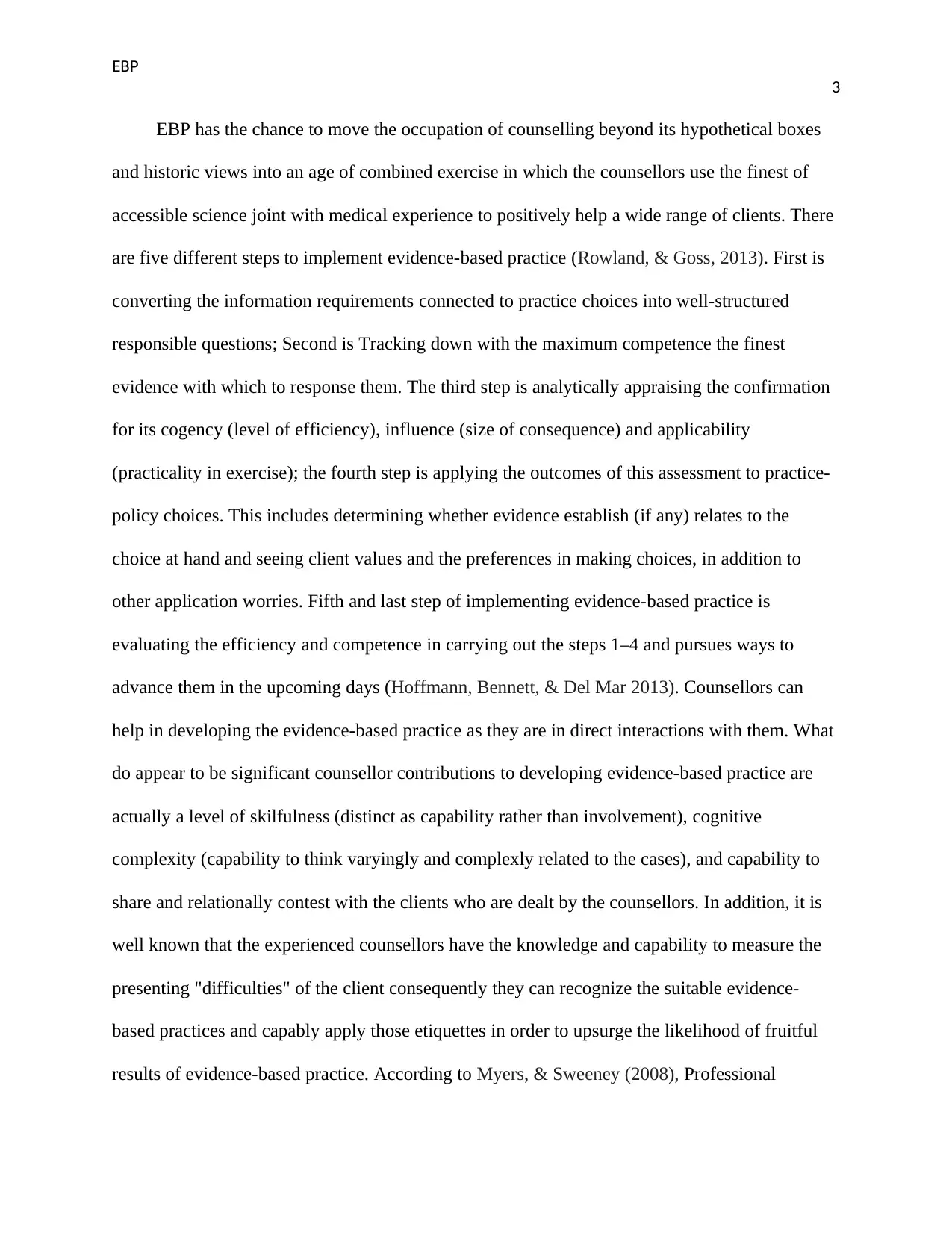
EBP
3
EBP has the chance to move the occupation of counselling beyond its hypothetical boxes
and historic views into an age of combined exercise in which the counsellors use the finest of
accessible science joint with medical experience to positively help a wide range of clients. There
are five different steps to implement evidence-based practice (Rowland, & Goss, 2013). First is
converting the information requirements connected to practice choices into well-structured
responsible questions; Second is Tracking down with the maximum competence the finest
evidence with which to response them. The third step is analytically appraising the confirmation
for its cogency (level of efficiency), influence (size of consequence) and applicability
(practicality in exercise); the fourth step is applying the outcomes of this assessment to practice-
policy choices. This includes determining whether evidence establish (if any) relates to the
choice at hand and seeing client values and the preferences in making choices, in addition to
other application worries. Fifth and last step of implementing evidence-based practice is
evaluating the efficiency and competence in carrying out the steps 1–4 and pursues ways to
advance them in the upcoming days (Hoffmann, Bennett, & Del Mar 2013). Counsellors can
help in developing the evidence-based practice as they are in direct interactions with them. What
do appear to be significant counsellor contributions to developing evidence-based practice are
actually a level of skilfulness (distinct as capability rather than involvement), cognitive
complexity (capability to think varyingly and complexly related to the cases), and capability to
share and relationally contest with the clients who are dealt by the counsellors. In addition, it is
well known that the experienced counsellors have the knowledge and capability to measure the
presenting "difficulties" of the client consequently they can recognize the suitable evidence-
based practices and capably apply those etiquettes in order to upsurge the likelihood of fruitful
results of evidence-based practice. According to Myers, & Sweeney (2008), Professional
3
EBP has the chance to move the occupation of counselling beyond its hypothetical boxes
and historic views into an age of combined exercise in which the counsellors use the finest of
accessible science joint with medical experience to positively help a wide range of clients. There
are five different steps to implement evidence-based practice (Rowland, & Goss, 2013). First is
converting the information requirements connected to practice choices into well-structured
responsible questions; Second is Tracking down with the maximum competence the finest
evidence with which to response them. The third step is analytically appraising the confirmation
for its cogency (level of efficiency), influence (size of consequence) and applicability
(practicality in exercise); the fourth step is applying the outcomes of this assessment to practice-
policy choices. This includes determining whether evidence establish (if any) relates to the
choice at hand and seeing client values and the preferences in making choices, in addition to
other application worries. Fifth and last step of implementing evidence-based practice is
evaluating the efficiency and competence in carrying out the steps 1–4 and pursues ways to
advance them in the upcoming days (Hoffmann, Bennett, & Del Mar 2013). Counsellors can
help in developing the evidence-based practice as they are in direct interactions with them. What
do appear to be significant counsellor contributions to developing evidence-based practice are
actually a level of skilfulness (distinct as capability rather than involvement), cognitive
complexity (capability to think varyingly and complexly related to the cases), and capability to
share and relationally contest with the clients who are dealt by the counsellors. In addition, it is
well known that the experienced counsellors have the knowledge and capability to measure the
presenting "difficulties" of the client consequently they can recognize the suitable evidence-
based practices and capably apply those etiquettes in order to upsurge the likelihood of fruitful
results of evidence-based practice. According to Myers, & Sweeney (2008), Professional
Paraphrase This Document
Need a fresh take? Get an instant paraphrase of this document with our AI Paraphraser
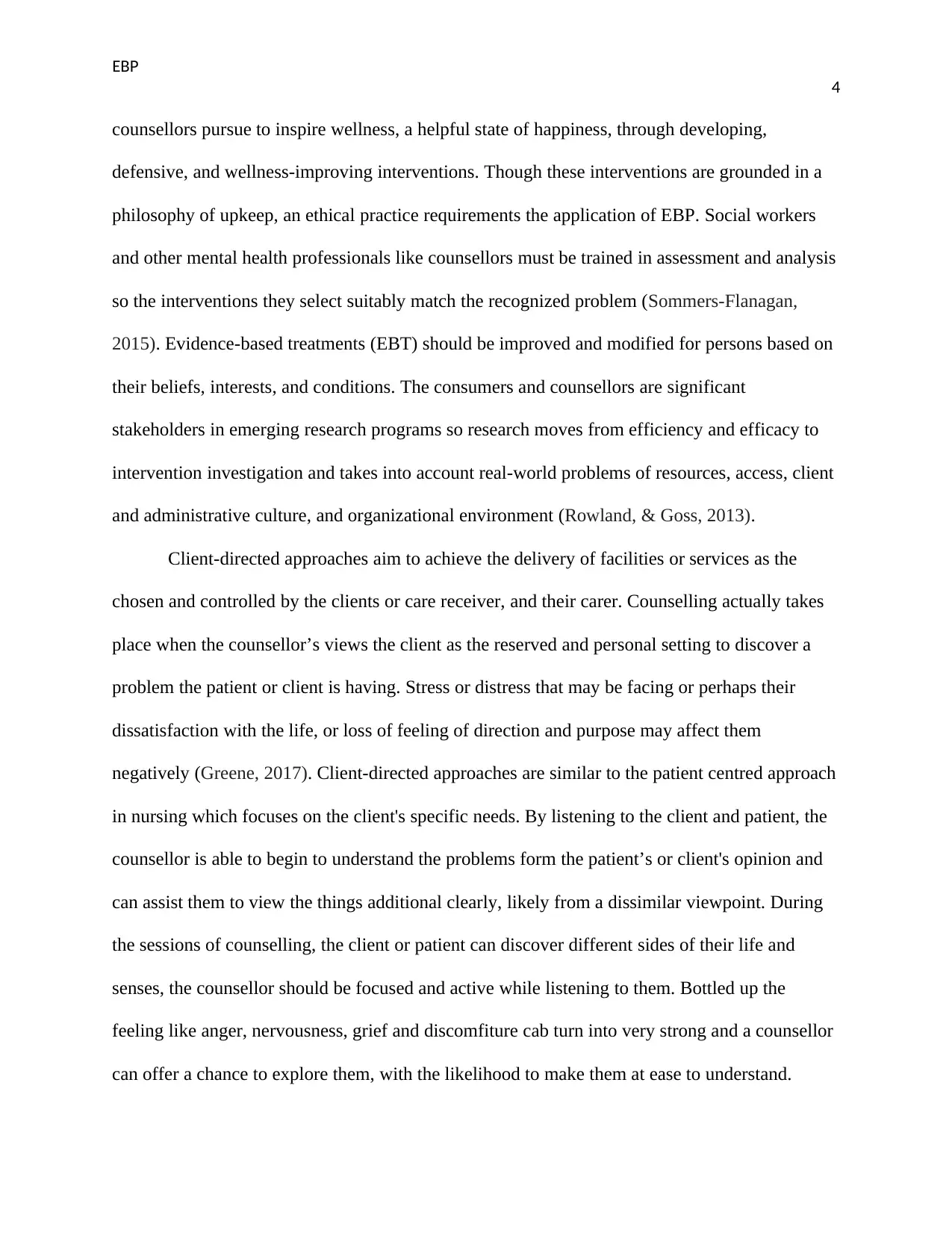
EBP
4
counsellors pursue to inspire wellness, a helpful state of happiness, through developing,
defensive, and wellness-improving interventions. Though these interventions are grounded in a
philosophy of upkeep, an ethical practice requirements the application of EBP. Social workers
and other mental health professionals like counsellors must be trained in assessment and analysis
so the interventions they select suitably match the recognized problem (Sommers-Flanagan,
2015). Evidence-based treatments (EBT) should be improved and modified for persons based on
their beliefs, interests, and conditions. The consumers and counsellors are significant
stakeholders in emerging research programs so research moves from efficiency and efficacy to
intervention investigation and takes into account real-world problems of resources, access, client
and administrative culture, and organizational environment (Rowland, & Goss, 2013).
Client-directed approaches aim to achieve the delivery of facilities or services as the
chosen and controlled by the clients or care receiver, and their carer. Counselling actually takes
place when the counsellor’s views the client as the reserved and personal setting to discover a
problem the patient or client is having. Stress or distress that may be facing or perhaps their
dissatisfaction with the life, or loss of feeling of direction and purpose may affect them
negatively (Greene, 2017). Client-directed approaches are similar to the patient centred approach
in nursing which focuses on the client's specific needs. By listening to the client and patient, the
counsellor is able to begin to understand the problems form the patient’s or client's opinion and
can assist them to view the things additional clearly, likely from a dissimilar viewpoint. During
the sessions of counselling, the client or patient can discover different sides of their life and
senses, the counsellor should be focused and active while listening to them. Bottled up the
feeling like anger, nervousness, grief and discomfiture cab turn into very strong and a counsellor
can offer a chance to explore them, with the likelihood to make them at ease to understand.
4
counsellors pursue to inspire wellness, a helpful state of happiness, through developing,
defensive, and wellness-improving interventions. Though these interventions are grounded in a
philosophy of upkeep, an ethical practice requirements the application of EBP. Social workers
and other mental health professionals like counsellors must be trained in assessment and analysis
so the interventions they select suitably match the recognized problem (Sommers-Flanagan,
2015). Evidence-based treatments (EBT) should be improved and modified for persons based on
their beliefs, interests, and conditions. The consumers and counsellors are significant
stakeholders in emerging research programs so research moves from efficiency and efficacy to
intervention investigation and takes into account real-world problems of resources, access, client
and administrative culture, and organizational environment (Rowland, & Goss, 2013).
Client-directed approaches aim to achieve the delivery of facilities or services as the
chosen and controlled by the clients or care receiver, and their carer. Counselling actually takes
place when the counsellor’s views the client as the reserved and personal setting to discover a
problem the patient or client is having. Stress or distress that may be facing or perhaps their
dissatisfaction with the life, or loss of feeling of direction and purpose may affect them
negatively (Greene, 2017). Client-directed approaches are similar to the patient centred approach
in nursing which focuses on the client's specific needs. By listening to the client and patient, the
counsellor is able to begin to understand the problems form the patient’s or client's opinion and
can assist them to view the things additional clearly, likely from a dissimilar viewpoint. During
the sessions of counselling, the client or patient can discover different sides of their life and
senses, the counsellor should be focused and active while listening to them. Bottled up the
feeling like anger, nervousness, grief and discomfiture cab turn into very strong and a counsellor
can offer a chance to explore them, with the likelihood to make them at ease to understand.
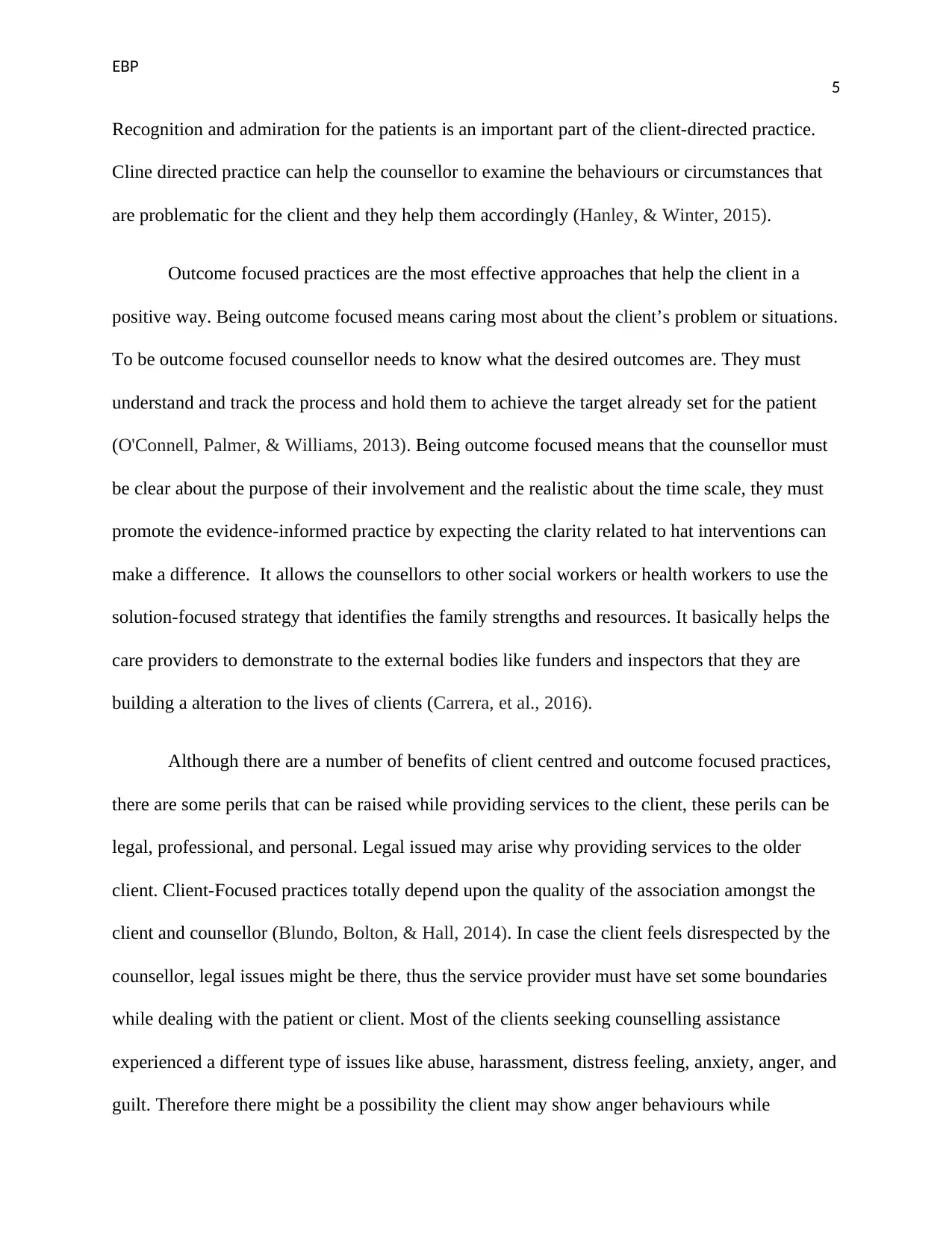
EBP
5
Recognition and admiration for the patients is an important part of the client-directed practice.
Cline directed practice can help the counsellor to examine the behaviours or circumstances that
are problematic for the client and they help them accordingly (Hanley, & Winter, 2015).
Outcome focused practices are the most effective approaches that help the client in a
positive way. Being outcome focused means caring most about the client’s problem or situations.
To be outcome focused counsellor needs to know what the desired outcomes are. They must
understand and track the process and hold them to achieve the target already set for the patient
(O'Connell, Palmer, & Williams, 2013). Being outcome focused means that the counsellor must
be clear about the purpose of their involvement and the realistic about the time scale, they must
promote the evidence-informed practice by expecting the clarity related to hat interventions can
make a difference. It allows the counsellors to other social workers or health workers to use the
solution-focused strategy that identifies the family strengths and resources. It basically helps the
care providers to demonstrate to the external bodies like funders and inspectors that they are
building a alteration to the lives of clients (Carrera, et al., 2016).
Although there are a number of benefits of client centred and outcome focused practices,
there are some perils that can be raised while providing services to the client, these perils can be
legal, professional, and personal. Legal issued may arise why providing services to the older
client. Client-Focused practices totally depend upon the quality of the association amongst the
client and counsellor (Blundo, Bolton, & Hall, 2014). In case the client feels disrespected by the
counsellor, legal issues might be there, thus the service provider must have set some boundaries
while dealing with the patient or client. Most of the clients seeking counselling assistance
experienced a different type of issues like abuse, harassment, distress feeling, anxiety, anger, and
guilt. Therefore there might be a possibility the client may show anger behaviours while
5
Recognition and admiration for the patients is an important part of the client-directed practice.
Cline directed practice can help the counsellor to examine the behaviours or circumstances that
are problematic for the client and they help them accordingly (Hanley, & Winter, 2015).
Outcome focused practices are the most effective approaches that help the client in a
positive way. Being outcome focused means caring most about the client’s problem or situations.
To be outcome focused counsellor needs to know what the desired outcomes are. They must
understand and track the process and hold them to achieve the target already set for the patient
(O'Connell, Palmer, & Williams, 2013). Being outcome focused means that the counsellor must
be clear about the purpose of their involvement and the realistic about the time scale, they must
promote the evidence-informed practice by expecting the clarity related to hat interventions can
make a difference. It allows the counsellors to other social workers or health workers to use the
solution-focused strategy that identifies the family strengths and resources. It basically helps the
care providers to demonstrate to the external bodies like funders and inspectors that they are
building a alteration to the lives of clients (Carrera, et al., 2016).
Although there are a number of benefits of client centred and outcome focused practices,
there are some perils that can be raised while providing services to the client, these perils can be
legal, professional, and personal. Legal issued may arise why providing services to the older
client. Client-Focused practices totally depend upon the quality of the association amongst the
client and counsellor (Blundo, Bolton, & Hall, 2014). In case the client feels disrespected by the
counsellor, legal issues might be there, thus the service provider must have set some boundaries
while dealing with the patient or client. Most of the clients seeking counselling assistance
experienced a different type of issues like abuse, harassment, distress feeling, anxiety, anger, and
guilt. Therefore there might be a possibility the client may show anger behaviours while
⊘ This is a preview!⊘
Do you want full access?
Subscribe today to unlock all pages.

Trusted by 1+ million students worldwide
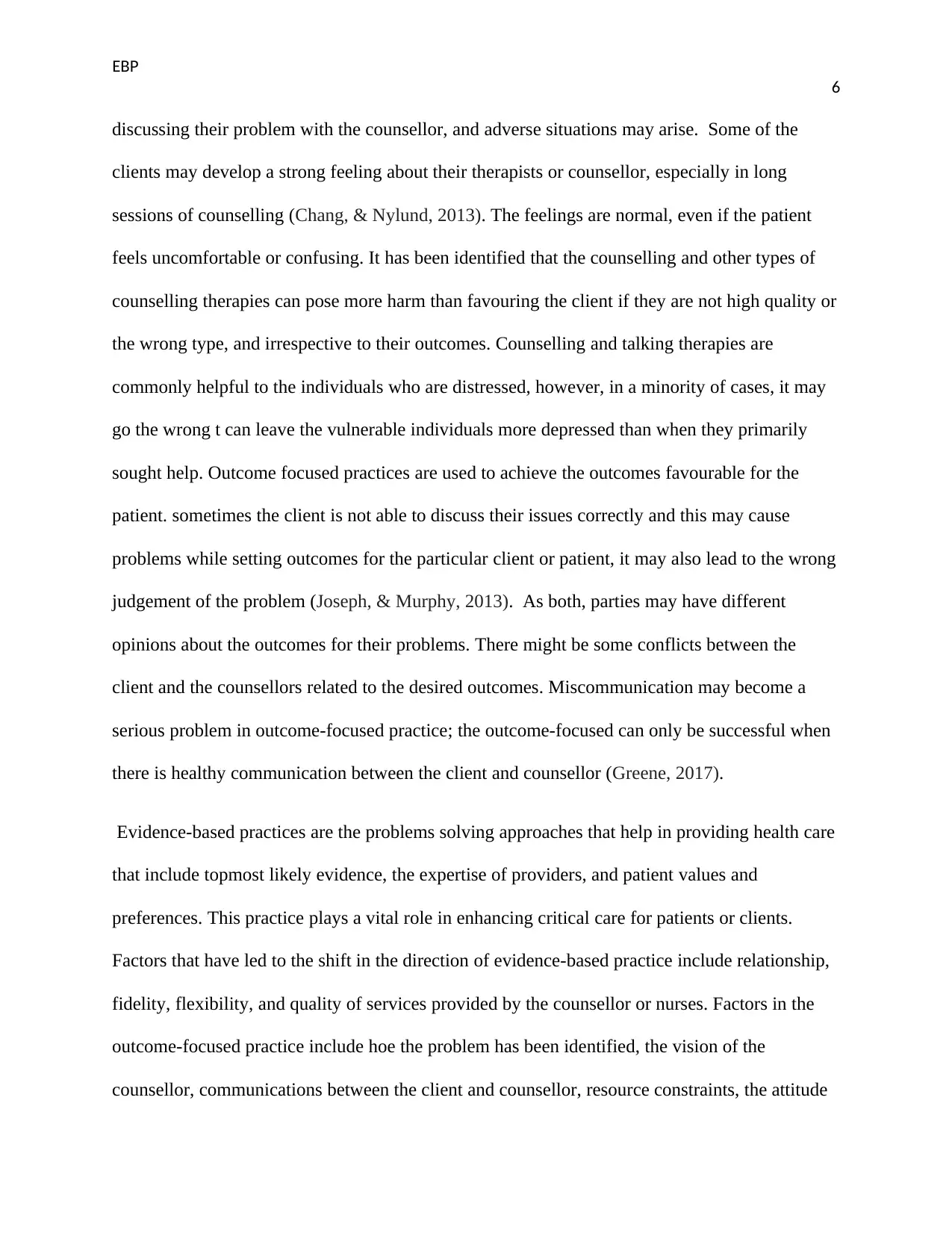
EBP
6
discussing their problem with the counsellor, and adverse situations may arise. Some of the
clients may develop a strong feeling about their therapists or counsellor, especially in long
sessions of counselling (Chang, & Nylund, 2013). The feelings are normal, even if the patient
feels uncomfortable or confusing. It has been identified that the counselling and other types of
counselling therapies can pose more harm than favouring the client if they are not high quality or
the wrong type, and irrespective to their outcomes. Counselling and talking therapies are
commonly helpful to the individuals who are distressed, however, in a minority of cases, it may
go the wrong t can leave the vulnerable individuals more depressed than when they primarily
sought help. Outcome focused practices are used to achieve the outcomes favourable for the
patient. sometimes the client is not able to discuss their issues correctly and this may cause
problems while setting outcomes for the particular client or patient, it may also lead to the wrong
judgement of the problem (Joseph, & Murphy, 2013). As both, parties may have different
opinions about the outcomes for their problems. There might be some conflicts between the
client and the counsellors related to the desired outcomes. Miscommunication may become a
serious problem in outcome-focused practice; the outcome-focused can only be successful when
there is healthy communication between the client and counsellor (Greene, 2017).
Evidence-based practices are the problems solving approaches that help in providing health care
that include topmost likely evidence, the expertise of providers, and patient values and
preferences. This practice plays a vital role in enhancing critical care for patients or clients.
Factors that have led to the shift in the direction of evidence-based practice include relationship,
fidelity, flexibility, and quality of services provided by the counsellor or nurses. Factors in the
outcome-focused practice include hoe the problem has been identified, the vision of the
counsellor, communications between the client and counsellor, resource constraints, the attitude
6
discussing their problem with the counsellor, and adverse situations may arise. Some of the
clients may develop a strong feeling about their therapists or counsellor, especially in long
sessions of counselling (Chang, & Nylund, 2013). The feelings are normal, even if the patient
feels uncomfortable or confusing. It has been identified that the counselling and other types of
counselling therapies can pose more harm than favouring the client if they are not high quality or
the wrong type, and irrespective to their outcomes. Counselling and talking therapies are
commonly helpful to the individuals who are distressed, however, in a minority of cases, it may
go the wrong t can leave the vulnerable individuals more depressed than when they primarily
sought help. Outcome focused practices are used to achieve the outcomes favourable for the
patient. sometimes the client is not able to discuss their issues correctly and this may cause
problems while setting outcomes for the particular client or patient, it may also lead to the wrong
judgement of the problem (Joseph, & Murphy, 2013). As both, parties may have different
opinions about the outcomes for their problems. There might be some conflicts between the
client and the counsellors related to the desired outcomes. Miscommunication may become a
serious problem in outcome-focused practice; the outcome-focused can only be successful when
there is healthy communication between the client and counsellor (Greene, 2017).
Evidence-based practices are the problems solving approaches that help in providing health care
that include topmost likely evidence, the expertise of providers, and patient values and
preferences. This practice plays a vital role in enhancing critical care for patients or clients.
Factors that have led to the shift in the direction of evidence-based practice include relationship,
fidelity, flexibility, and quality of services provided by the counsellor or nurses. Factors in the
outcome-focused practice include hoe the problem has been identified, the vision of the
counsellor, communications between the client and counsellor, resource constraints, the attitude
Paraphrase This Document
Need a fresh take? Get an instant paraphrase of this document with our AI Paraphraser
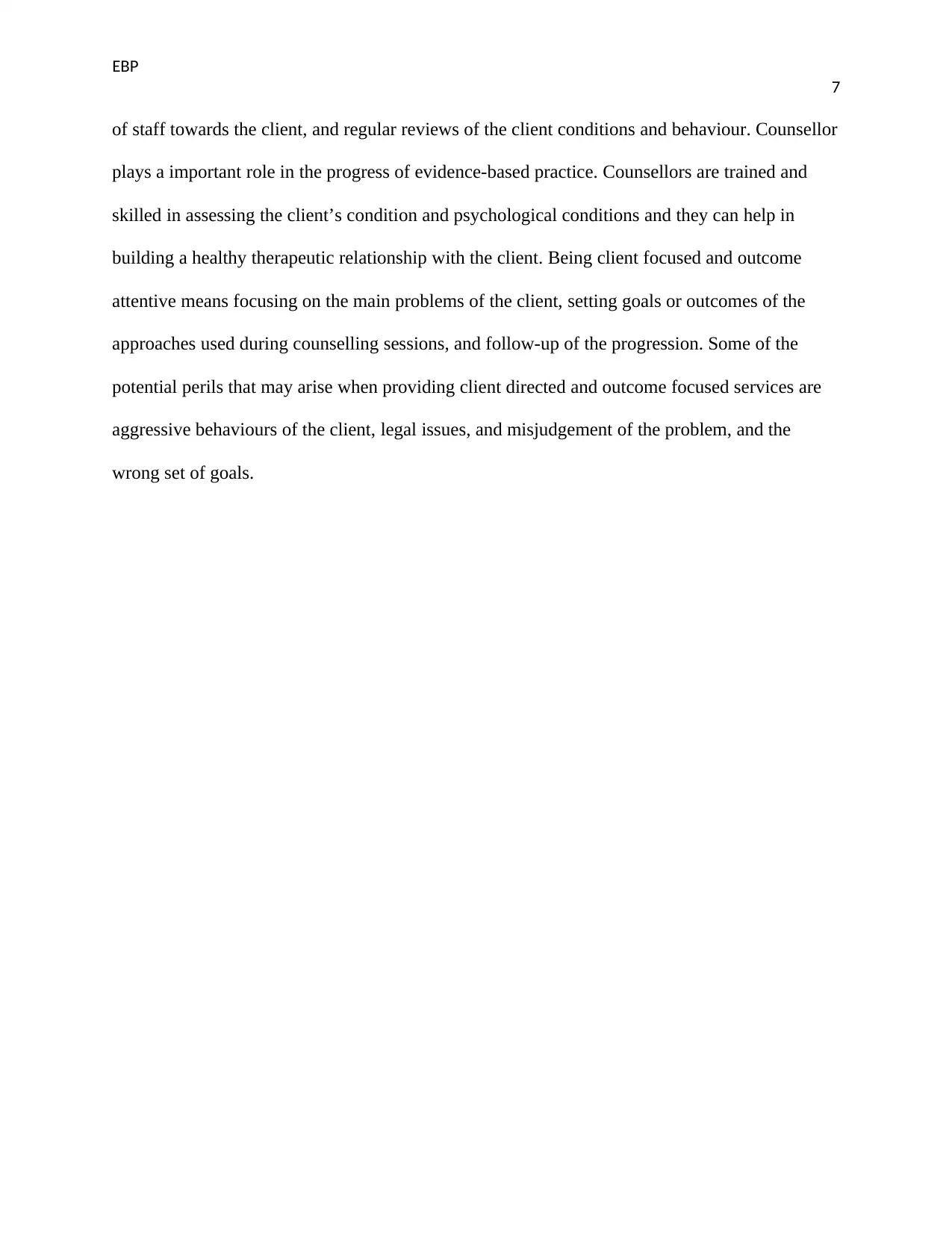
EBP
7
of staff towards the client, and regular reviews of the client conditions and behaviour. Counsellor
plays a important role in the progress of evidence-based practice. Counsellors are trained and
skilled in assessing the client’s condition and psychological conditions and they can help in
building a healthy therapeutic relationship with the client. Being client focused and outcome
attentive means focusing on the main problems of the client, setting goals or outcomes of the
approaches used during counselling sessions, and follow-up of the progression. Some of the
potential perils that may arise when providing client directed and outcome focused services are
aggressive behaviours of the client, legal issues, and misjudgement of the problem, and the
wrong set of goals.
7
of staff towards the client, and regular reviews of the client conditions and behaviour. Counsellor
plays a important role in the progress of evidence-based practice. Counsellors are trained and
skilled in assessing the client’s condition and psychological conditions and they can help in
building a healthy therapeutic relationship with the client. Being client focused and outcome
attentive means focusing on the main problems of the client, setting goals or outcomes of the
approaches used during counselling sessions, and follow-up of the progression. Some of the
potential perils that may arise when providing client directed and outcome focused services are
aggressive behaviours of the client, legal issues, and misjudgement of the problem, and the
wrong set of goals.
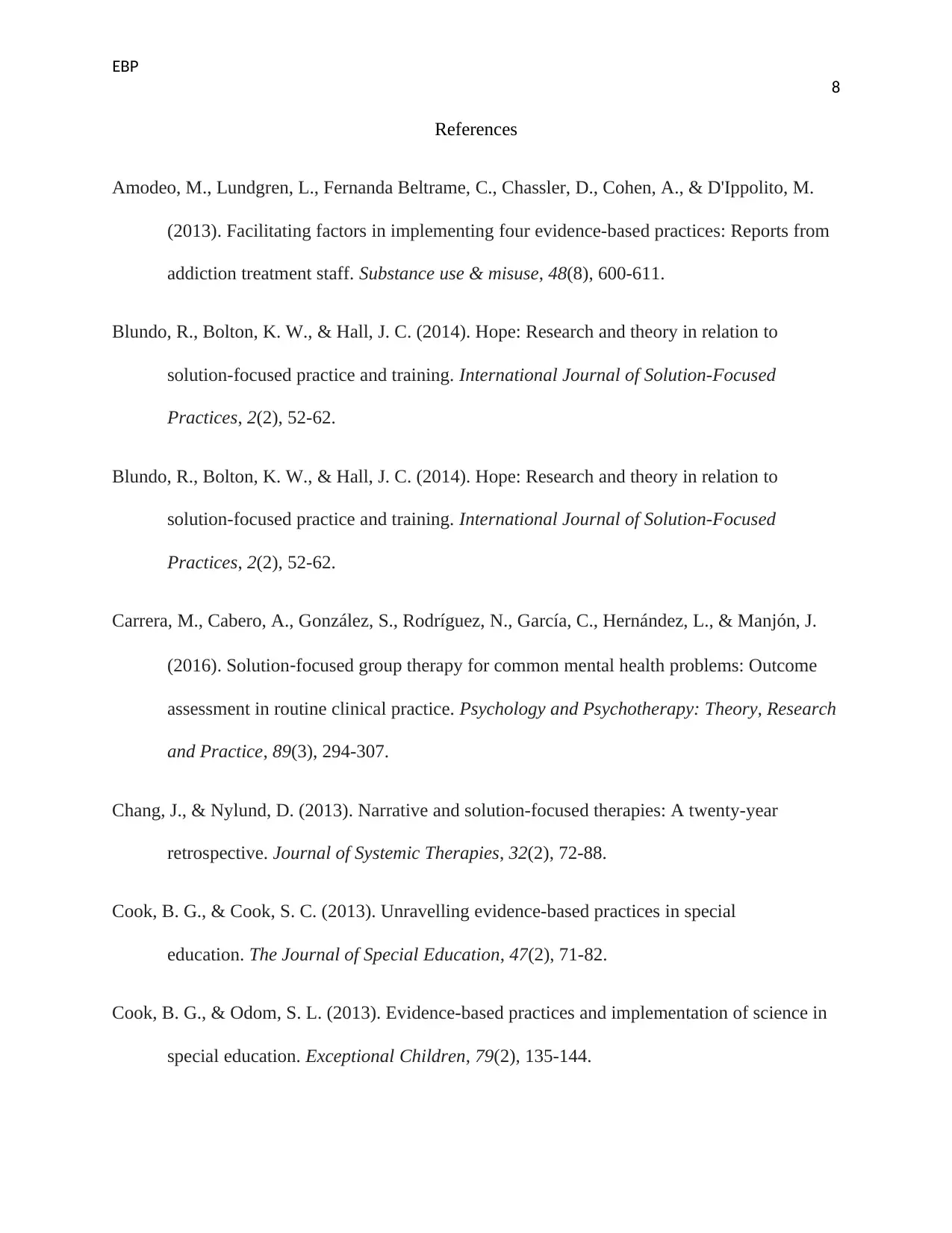
EBP
8
References
Amodeo, M., Lundgren, L., Fernanda Beltrame, C., Chassler, D., Cohen, A., & D'Ippolito, M.
(2013). Facilitating factors in implementing four evidence-based practices: Reports from
addiction treatment staff. Substance use & misuse, 48(8), 600-611.
Blundo, R., Bolton, K. W., & Hall, J. C. (2014). Hope: Research and theory in relation to
solution-focused practice and training. International Journal of Solution-Focused
Practices, 2(2), 52-62.
Blundo, R., Bolton, K. W., & Hall, J. C. (2014). Hope: Research and theory in relation to
solution-focused practice and training. International Journal of Solution-Focused
Practices, 2(2), 52-62.
Carrera, M., Cabero, A., González, S., Rodríguez, N., García, C., Hernández, L., & Manjón, J.
(2016). Solution‐focused group therapy for common mental health problems: Outcome
assessment in routine clinical practice. Psychology and Psychotherapy: Theory, Research
and Practice, 89(3), 294-307.
Chang, J., & Nylund, D. (2013). Narrative and solution-focused therapies: A twenty-year
retrospective. Journal of Systemic Therapies, 32(2), 72-88.
Cook, B. G., & Cook, S. C. (2013). Unravelling evidence-based practices in special
education. The Journal of Special Education, 47(2), 71-82.
Cook, B. G., & Odom, S. L. (2013). Evidence-based practices and implementation of science in
special education. Exceptional Children, 79(2), 135-144.
8
References
Amodeo, M., Lundgren, L., Fernanda Beltrame, C., Chassler, D., Cohen, A., & D'Ippolito, M.
(2013). Facilitating factors in implementing four evidence-based practices: Reports from
addiction treatment staff. Substance use & misuse, 48(8), 600-611.
Blundo, R., Bolton, K. W., & Hall, J. C. (2014). Hope: Research and theory in relation to
solution-focused practice and training. International Journal of Solution-Focused
Practices, 2(2), 52-62.
Blundo, R., Bolton, K. W., & Hall, J. C. (2014). Hope: Research and theory in relation to
solution-focused practice and training. International Journal of Solution-Focused
Practices, 2(2), 52-62.
Carrera, M., Cabero, A., González, S., Rodríguez, N., García, C., Hernández, L., & Manjón, J.
(2016). Solution‐focused group therapy for common mental health problems: Outcome
assessment in routine clinical practice. Psychology and Psychotherapy: Theory, Research
and Practice, 89(3), 294-307.
Chang, J., & Nylund, D. (2013). Narrative and solution-focused therapies: A twenty-year
retrospective. Journal of Systemic Therapies, 32(2), 72-88.
Cook, B. G., & Cook, S. C. (2013). Unravelling evidence-based practices in special
education. The Journal of Special Education, 47(2), 71-82.
Cook, B. G., & Odom, S. L. (2013). Evidence-based practices and implementation of science in
special education. Exceptional Children, 79(2), 135-144.
⊘ This is a preview!⊘
Do you want full access?
Subscribe today to unlock all pages.

Trusted by 1+ million students worldwide
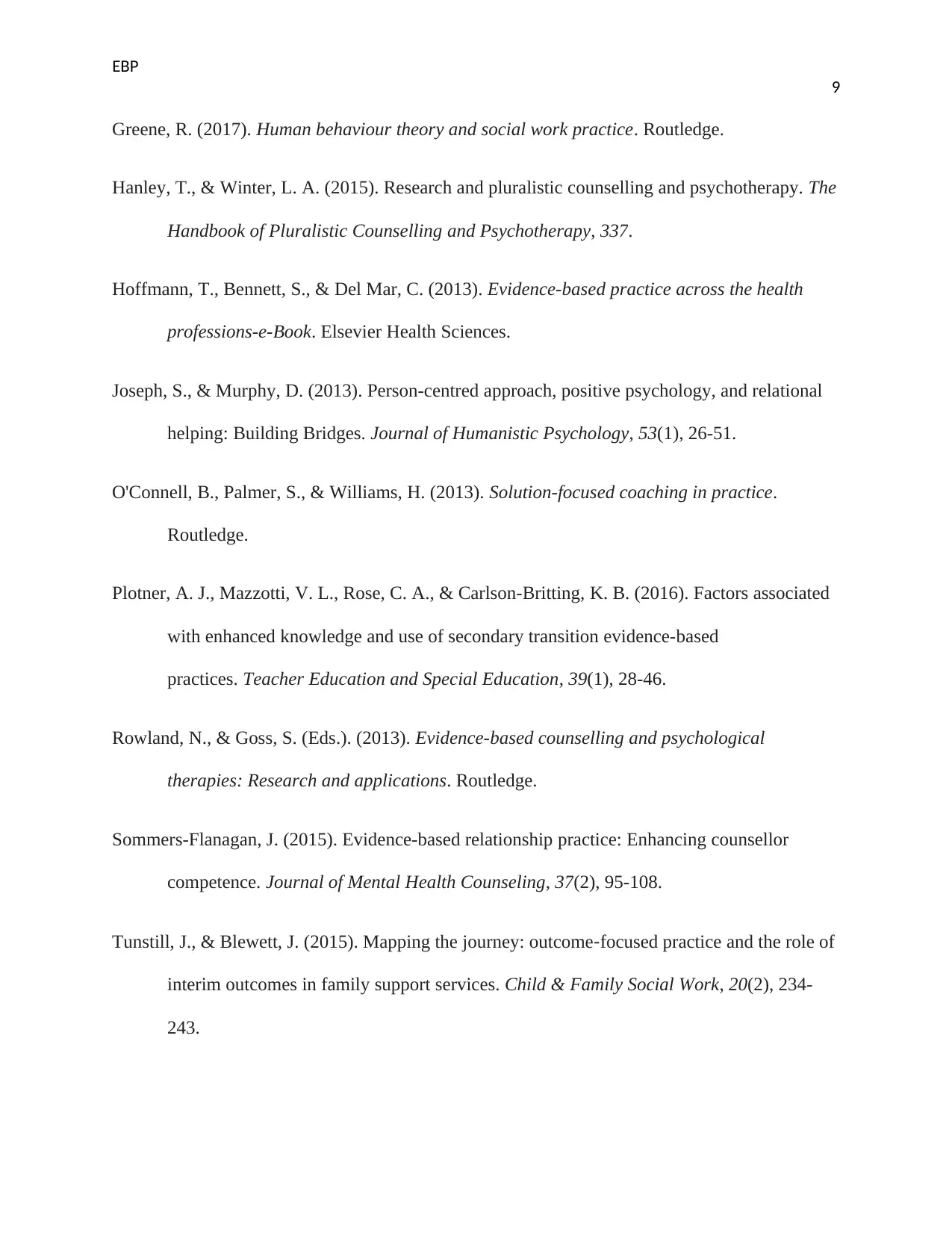
EBP
9
Greene, R. (2017). Human behaviour theory and social work practice. Routledge.
Hanley, T., & Winter, L. A. (2015). Research and pluralistic counselling and psychotherapy. The
Handbook of Pluralistic Counselling and Psychotherapy, 337.
Hoffmann, T., Bennett, S., & Del Mar, C. (2013). Evidence-based practice across the health
professions-e-Book. Elsevier Health Sciences.
Joseph, S., & Murphy, D. (2013). Person-centred approach, positive psychology, and relational
helping: Building Bridges. Journal of Humanistic Psychology, 53(1), 26-51.
O'Connell, B., Palmer, S., & Williams, H. (2013). Solution-focused coaching in practice.
Routledge.
Plotner, A. J., Mazzotti, V. L., Rose, C. A., & Carlson-Britting, K. B. (2016). Factors associated
with enhanced knowledge and use of secondary transition evidence-based
practices. Teacher Education and Special Education, 39(1), 28-46.
Rowland, N., & Goss, S. (Eds.). (2013). Evidence-based counselling and psychological
therapies: Research and applications. Routledge.
Sommers-Flanagan, J. (2015). Evidence-based relationship practice: Enhancing counsellor
competence. Journal of Mental Health Counseling, 37(2), 95-108.
Tunstill, J., & Blewett, J. (2015). Mapping the journey: outcome‐focused practice and the role of
interim outcomes in family support services. Child & Family Social Work, 20(2), 234-
243.
9
Greene, R. (2017). Human behaviour theory and social work practice. Routledge.
Hanley, T., & Winter, L. A. (2015). Research and pluralistic counselling and psychotherapy. The
Handbook of Pluralistic Counselling and Psychotherapy, 337.
Hoffmann, T., Bennett, S., & Del Mar, C. (2013). Evidence-based practice across the health
professions-e-Book. Elsevier Health Sciences.
Joseph, S., & Murphy, D. (2013). Person-centred approach, positive psychology, and relational
helping: Building Bridges. Journal of Humanistic Psychology, 53(1), 26-51.
O'Connell, B., Palmer, S., & Williams, H. (2013). Solution-focused coaching in practice.
Routledge.
Plotner, A. J., Mazzotti, V. L., Rose, C. A., & Carlson-Britting, K. B. (2016). Factors associated
with enhanced knowledge and use of secondary transition evidence-based
practices. Teacher Education and Special Education, 39(1), 28-46.
Rowland, N., & Goss, S. (Eds.). (2013). Evidence-based counselling and psychological
therapies: Research and applications. Routledge.
Sommers-Flanagan, J. (2015). Evidence-based relationship practice: Enhancing counsellor
competence. Journal of Mental Health Counseling, 37(2), 95-108.
Tunstill, J., & Blewett, J. (2015). Mapping the journey: outcome‐focused practice and the role of
interim outcomes in family support services. Child & Family Social Work, 20(2), 234-
243.
Paraphrase This Document
Need a fresh take? Get an instant paraphrase of this document with our AI Paraphraser
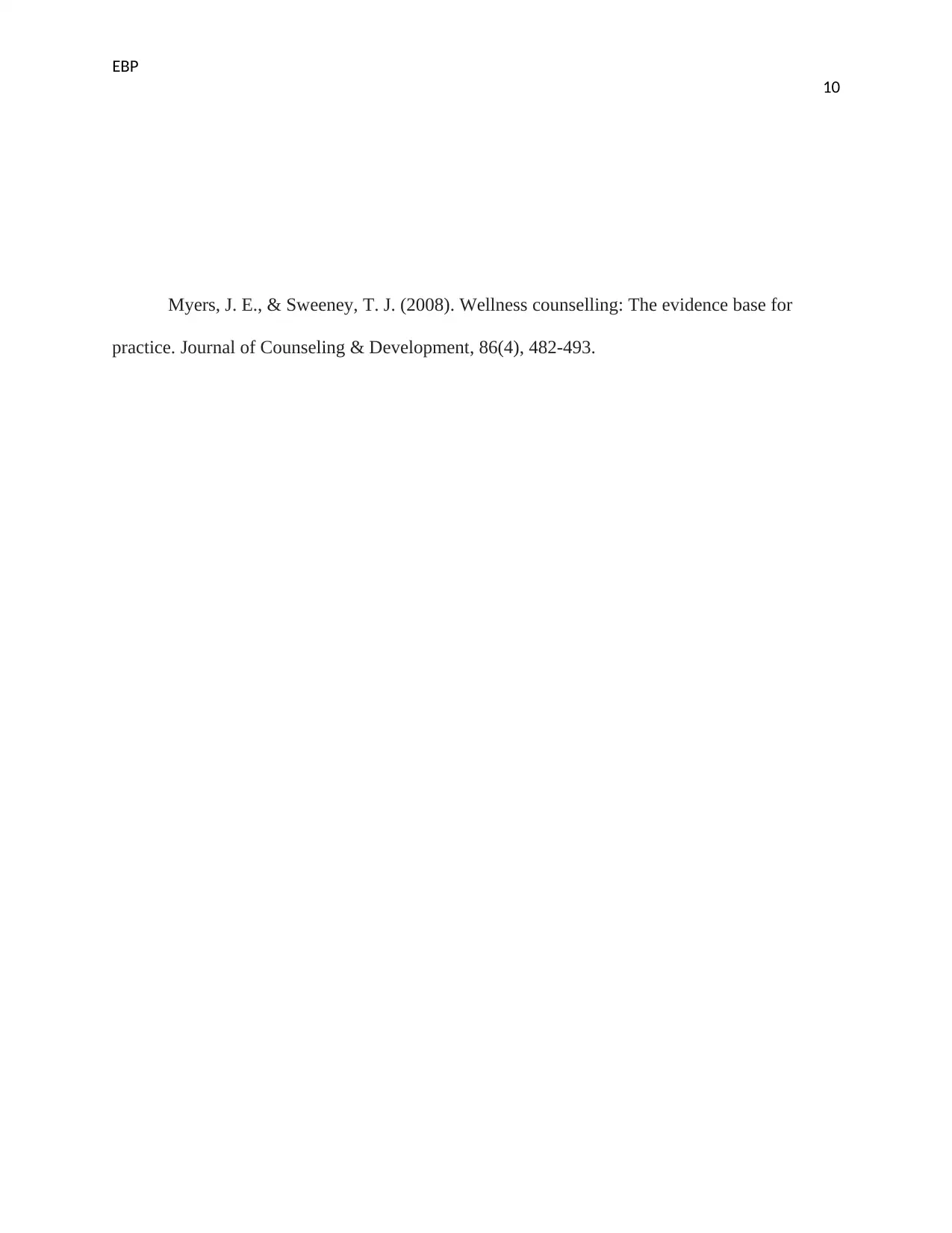
EBP
10
Myers, J. E., & Sweeney, T. J. (2008). Wellness counselling: The evidence base for
practice. Journal of Counseling & Development, 86(4), 482-493.
10
Myers, J. E., & Sweeney, T. J. (2008). Wellness counselling: The evidence base for
practice. Journal of Counseling & Development, 86(4), 482-493.
1 out of 11
Your All-in-One AI-Powered Toolkit for Academic Success.
+13062052269
info@desklib.com
Available 24*7 on WhatsApp / Email
![[object Object]](/_next/static/media/star-bottom.7253800d.svg)
Unlock your academic potential
Copyright © 2020–2025 A2Z Services. All Rights Reserved. Developed and managed by ZUCOL.


